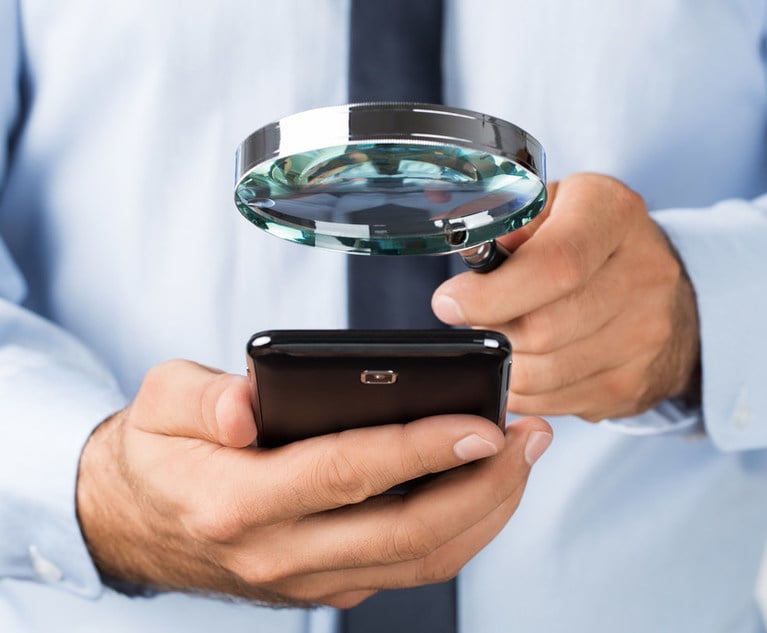Common Pitfalls In Personal Device Collection
Both the DOJ and the SEC have made it clear that they will look at company BYOD policies when assessing how to resolve matters under their purview. To avoid pitfalls — and sanctions — counsel must take proactive steps to ensure proper preservation and collection of personal mobile data and verify that clients comply.
April 16, 2024 at 04:39 PM
8 minute read
What You Need to Know
- The increasing frequency of "bring your own device" policies creates serious implications for subpoena recipients and litigants to ensure compliance with discovery requests for forensic collections of text messages..
- Entities should review their policies to ensure that they prohibit conducting company business on personal devices and provide for the company's right to image personal devices if they do contain business communications.
- Proactive review of your company's "bring your own device" policies is critical.

Litigants increasingly face subpoenas or discovery requests for forensic collections of text messages. The increasing frequency of "bring your own device" policies creates serious implications for subpoena recipients and litigants to ensure compliance with these demands. And courts across the country consider such personal mobile data fair game. To avoid pitfalls — and sanctions — counsel must take proactive steps to ensure proper preservation and collection of personal mobile data and verify that clients comply.
Entities should also review their policies to ensure that they prohibit conducting company business on personal devices and provide for the company's right to image personal devices if they do contain business communications. Both the Department of Justice (DOJ) and the Securities and Exchange Commission (SEC) have made it clear that they will look at company policies when assessing how to resolve matters under their purview.
This content has been archived. It is available through our partners, LexisNexis® and Bloomberg Law.
To view this content, please continue to their sites.
Not a Lexis Subscriber?
Subscribe Now
Not a Bloomberg Law Subscriber?
Subscribe Now
NOT FOR REPRINT
© 2025 ALM Global, LLC, All Rights Reserved. Request academic re-use from www.copyright.com. All other uses, submit a request to [email protected]. For more information visit Asset & Logo Licensing.
You Might Like
View All
King & Spalding E-Discovery Director Jumps to Nebraska Women-Owned Firm
4 minute read
Less Is More: The Risks of Excessive Data Collection from Mobile Devices
6 minute read
Law Firms Mentioned
Trending Stories
- 1Rejuvenation of a Sharp Employer Non-Compete Tool: Delaware Supreme Court Reinvigorates the Employee Choice Doctrine
- 2Mastering Litigation in New York’s Commercial Division Part V, Leave It to the Experts: Expert Discovery in the New York Commercial Division
- 3GOP-Led SEC Tightens Control Over Enforcement Investigations, Lawyers Say
- 4Transgender Care Fight Targets More Adults as Georgia, Other States Weigh Laws
- 5Roundup Special Master's Report Recommends Lead Counsel Get $0 in Common Benefit Fees
Who Got The Work
J. Brugh Lower of Gibbons has entered an appearance for industrial equipment supplier Devco Corporation in a pending trademark infringement lawsuit. The suit, accusing the defendant of selling knock-off Graco products, was filed Dec. 18 in New Jersey District Court by Rivkin Radler on behalf of Graco Inc. and Graco Minnesota. The case, assigned to U.S. District Judge Zahid N. Quraishi, is 3:24-cv-11294, Graco Inc. et al v. Devco Corporation.
Who Got The Work
Rebecca Maller-Stein and Kent A. Yalowitz of Arnold & Porter Kaye Scholer have entered their appearances for Hanaco Venture Capital and its executives, Lior Prosor and David Frankel, in a pending securities lawsuit. The action, filed on Dec. 24 in New York Southern District Court by Zell, Aron & Co. on behalf of Goldeneye Advisors, accuses the defendants of negligently and fraudulently managing the plaintiff's $1 million investment. The case, assigned to U.S. District Judge Vernon S. Broderick, is 1:24-cv-09918, Goldeneye Advisors, LLC v. Hanaco Venture Capital, Ltd. et al.
Who Got The Work
Attorneys from A&O Shearman has stepped in as defense counsel for Toronto-Dominion Bank and other defendants in a pending securities class action. The suit, filed Dec. 11 in New York Southern District Court by Bleichmar Fonti & Auld, accuses the defendants of concealing the bank's 'pervasive' deficiencies in regards to its compliance with the Bank Secrecy Act and the quality of its anti-money laundering controls. The case, assigned to U.S. District Judge Arun Subramanian, is 1:24-cv-09445, Gonzalez v. The Toronto-Dominion Bank et al.
Who Got The Work
Crown Castle International, a Pennsylvania company providing shared communications infrastructure, has turned to Luke D. Wolf of Gordon Rees Scully Mansukhani to fend off a pending breach-of-contract lawsuit. The court action, filed Nov. 25 in Michigan Eastern District Court by Hooper Hathaway PC on behalf of The Town Residences LLC, accuses Crown Castle of failing to transfer approximately $30,000 in utility payments from T-Mobile in breach of a roof-top lease and assignment agreement. The case, assigned to U.S. District Judge Susan K. Declercq, is 2:24-cv-13131, The Town Residences LLC v. T-Mobile US, Inc. et al.
Who Got The Work
Wilfred P. Coronato and Daniel M. Schwartz of McCarter & English have stepped in as defense counsel to Electrolux Home Products Inc. in a pending product liability lawsuit. The court action, filed Nov. 26 in New York Eastern District Court by Poulos Lopiccolo PC and Nagel Rice LLP on behalf of David Stern, alleges that the defendant's refrigerators’ drawers and shelving repeatedly break and fall apart within months after purchase. The case, assigned to U.S. District Judge Joan M. Azrack, is 2:24-cv-08204, Stern v. Electrolux Home Products, Inc.
Featured Firms
Law Offices of Gary Martin Hays & Associates, P.C.
(470) 294-1674
Law Offices of Mark E. Salomone
(857) 444-6468
Smith & Hassler
(713) 739-1250









